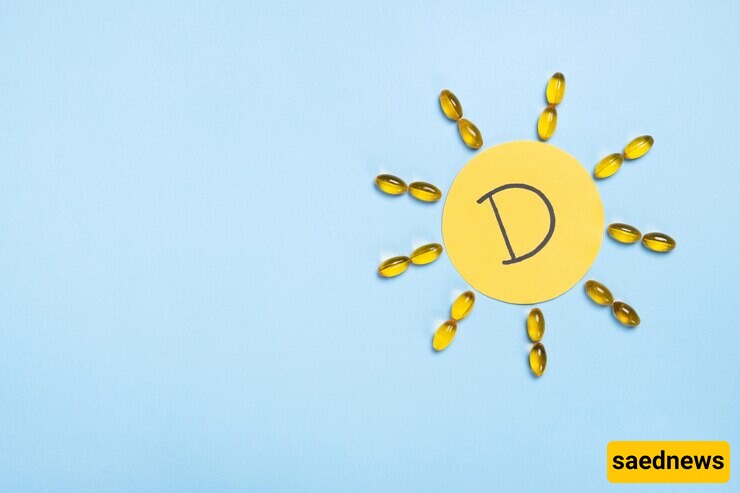SAEDNEWS: Vitamin D is one of the most common dietary supplements, and various factors can affect its effectiveness, including the timing and method of consumption.

According to SAEDNEWS, whether to take Vitamin D in the morning or at night depends on several factors. One of the most important considerations is that Vitamin D is fat-soluble, meaning it is better absorbed when taken with a source of dietary fat. Some fat-rich foods include peanut butter, full-fat dairy products, non-dairy milk, and olives.

Taking your Vitamin D supplement in the morning can be an excellent choice, especially if you have a consistent morning routine. Pairing your supplement with breakfast or immediately after your morning meal ensures better absorption, as Vitamin D is a fat-soluble vitamin, meaning it dissolves in fat and is best absorbed when taken with foods containing healthy fats.
Many people prefer taking supplements in the morning simply because it’s easier to build a habit around a morning routine. For example:
If you start your day with a balanced breakfast, like scrambled eggs, avocado toast, or full-fat yogurt with granola, you’re already consuming healthy fats. These fats help your body absorb Vitamin D more effectively.
A quick glass of milk or a smoothie with nut butter (like almond or peanut butter) also works as a great companion for your Vitamin D supplement.
Additionally, if you have other morning habits—like drinking coffee, journaling, or exercising—you can easily incorporate taking your supplement into that routine. Setting an alarm or placing your Vitamin D bottle next to your coffee machine can serve as helpful reminders.
Morning supplementation is particularly beneficial for individuals who have active daytime schedules. If you spend time outdoors in the sun or engage in morning workouts, Vitamin D can complement your body’s natural production from sunlight exposure. For example:
Outdoor joggers or cyclists: Morning sunlight can naturally trigger Vitamin D synthesis in your skin. Pairing it with a supplement ensures your body gets a sufficient amount.
Busy professionals: For people who work long hours indoors and might miss sunlight exposure, taking Vitamin D in the morning serves as an insurance policy for their daily intake.
In short, morning intake is an ideal strategy if you thrive on routine, have a substantial breakfast, or simply want to "check it off your list" early in the day.
If mornings are chaotic or if you’re someone who frequently skips breakfast, taking Vitamin D at night might be the better choice. The key to effective absorption remains the same: pair your supplement with an evening meal or a healthy nighttime snack containing fats.
Evening meals are often larger: Dinner tends to be one of the most substantial meals of the day for many people, and larger meals often contain fats from foods like salmon, olive oil, nuts, cheese, or avocado. These fats naturally enhance Vitamin D absorption.
More time for absorption: During sleep, the body undergoes repair and recovery processes. Some research suggests that taking supplements in the evening allows your body to focus on nutrient absorption while you're at rest.
For example:
If you’re having grilled salmon with roasted vegetables and olive oil for dinner, it’s a perfect opportunity to take your Vitamin D supplement.
A nighttime snack like Greek yogurt with a handful of almonds can also provide the necessary fat content to aid absorption.
Some people have a more structured evening routine compared to their mornings. If you already have habits like drinking herbal tea, reading, or taking other evening supplements (e.g., magnesium for relaxation), it’s easier to include Vitamin D in this nightly ritual.
There’s also emerging evidence suggesting that adequate Vitamin D levels might play a role in improving sleep quality. While research is still ongoing, some people report better rest when they take Vitamin D in the evening.
For example:
A person who struggles with seasonal affective disorder (SAD) might find nighttime supplementation calming.
Someone working night shifts might find it more convenient to take their Vitamin D after their main meal, even if it’s technically early morning.
Ultimately, the best time to take Vitamin D depends on your lifestyle, meal habits, and consistency.
Choose Morning if you have a structured breakfast routine, prefer starting your day with supplements, or spend time outdoors in the sunlight.
Choose Night if your dinner is your largest meal, mornings are rushed, or you find it easier to remember supplements during your evening wind-down.
Always pair Vitamin D with a meal rich in healthy fats (e.g., eggs, fatty fish, nuts, avocado).
Be consistent—stick to either morning or night based on what fits your routine.
Set reminders—use alarms, phone apps, or visual cues (e.g., keeping the bottle near your toothbrush or dining table).
No matter when you take your Vitamin D supplement, consistency is the most important factor. Whether it’s with your avocado toast at breakfast or grilled salmon at dinner, what matters is ensuring you meet your daily Vitamin D needs for overall health and well-being.

